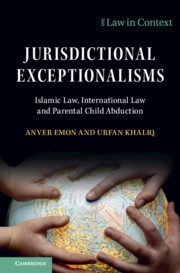Book contents
- Jurisdictional Exceptionalisms
- Law in Context Series
- Jurisdictional Exceptionalisms
- Copyright page
- Dedication
- Contents
- Tables
- Preface and Acknowledgements
- Abbreviations
- 1 Introduction
- Part I
- Part II
- 4 Islamic Law and Child Custody
- 5 Jurisdictional Exceptionalism and Islamic Law
- 6 Private International Law, Muslim Family Law States, and Strategic Jurisdiction
- 7 Conclusion
- Bibliography
- Index
6 - Private International Law, Muslim Family Law States, and Strategic Jurisdiction
from Part II
Published online by Cambridge University Press: 23 July 2021
- Jurisdictional Exceptionalisms
- Law in Context Series
- Jurisdictional Exceptionalisms
- Copyright page
- Dedication
- Contents
- Tables
- Preface and Acknowledgements
- Abbreviations
- 1 Introduction
- Part I
- Part II
- 4 Islamic Law and Child Custody
- 5 Jurisdictional Exceptionalism and Islamic Law
- 6 Private International Law, Muslim Family Law States, and Strategic Jurisdiction
- 7 Conclusion
- Bibliography
- Index
Summary
Chapter 6 examines the Muslim Family Laws of the United Arab Emirates, Tunisia, and Malaysia in light of their jurisprudence on jurisdiction. The selection of these states represents a geographically, culturally, and legally diverse sample, across which Islamic Law remains legally relevant. The chapter examines how differing approaches to jurisdiction or child custody have been adopted and what the implications of these are or may be in the context of seeking to address international parental child abduction. The selected case studies highlight different approaches that lend themselves to finding solutions to addressing international parental child abductions. One matter that traverses all three case studies concerns the capacity of domestic judges, with subject matter jurisdiction on family law, to think jurisdictionally. As the case studies show, a key concern for policy-makers in Muslim Family Law States has been to consider a whole-of-law approach to jurisprudence. For others, the challenge lies in recognising the Muslim Family Law States as disaggregated institutionally, and to strategise approaches that are institution-specific.
Keywords
- Type
- Chapter
- Information
- Jurisdictional ExceptionalismsIslamic Law, International Law and Parental Child Abduction, pp. 296 - 330Publisher: Cambridge University PressPrint publication year: 2021

